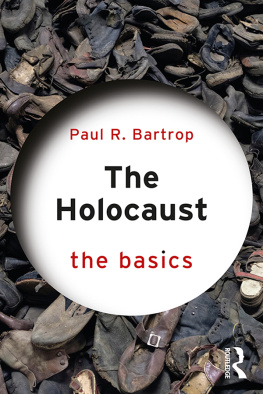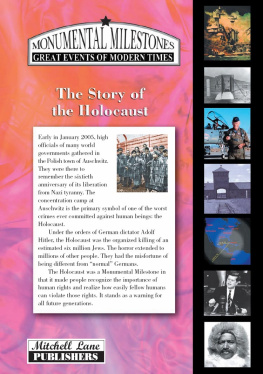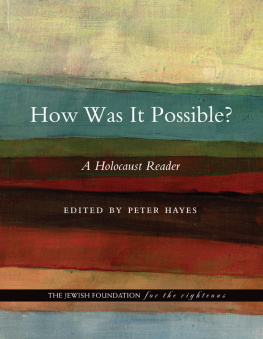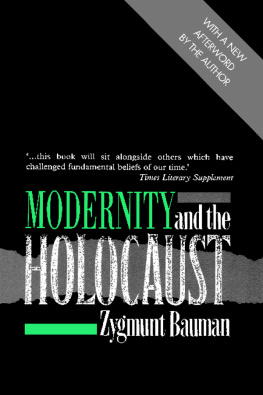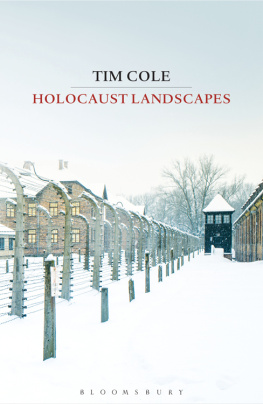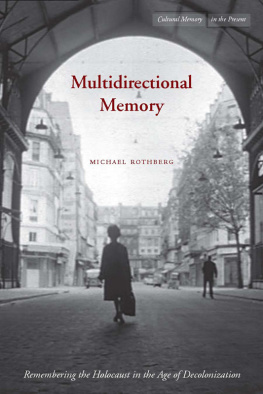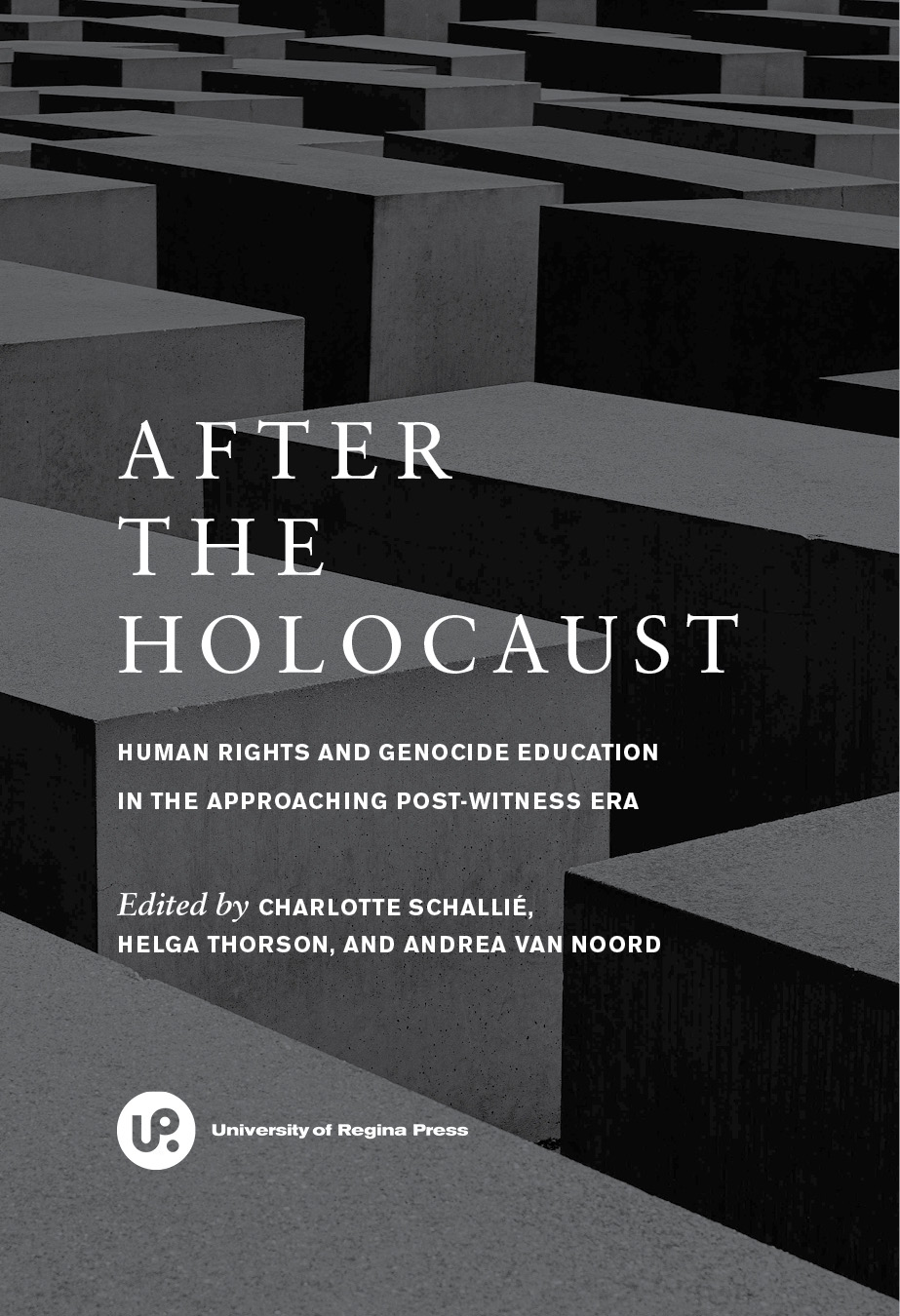Advance Praise for
After the Holocaust
An unusually passionate, wide-ranging, and deeply informed volume that engages tough questions and eschews simple answers. Henry Greenspan, author of On Listening to Holocaust Survivors: Beyond Testimony
Past meets future in this thoughtful work of insight and wisdom. Witnesses and teachers bridge Holocaust memory and scholarship preparing us for a post-witness world where justice and human rights prevail. Robert Krell, author of Child Holocaust Survivors: Memories and Reflections
The first- and second-generation survivor accounts are treasuresinvaluable reflections that anchor this collection. David B. MacDonald, author of The Sleeping Giant Awakens: Genocide, Indian Residential Schools, and the Challenge of Conciliation
After the Holocaust is a ground-breaking volume that brings together a diverse and eclectic group of scholars, artists, and activists to probe deeply the vicissitudes of the Holocaust. Leslie Morris, author of The Translated Jew: German Jewish Culture outside the Margins
2020 University of Regina Press
All rights reserved. No part of this work covered by the copyrights hereon may be reproduced or used in any form or by any meansgraphic, electronic, or mechanicalwithout the prior written permission of the publisher. Any request for photocopying, recording, taping or placement in information storage and retrieval systems of any sort shall be directed in writing to Access Copyright.
Printed and bound in Canada at Imprimerie Gauvin . The text of this book is printed on 100% post-consumer recycled paper with earth-friendly vegetable-based inks.
Cover art: Holocaust Memorial, Berlin, Germany, photo by Augustine Wong
on Unsplash.
Cover and text design: Duncan Campbell, University of Regina Press
Copy editor: Ryan Perks
Proofreader: Alison Strobel
Indexer: Patricia Furdek
Library and Archives Canada Cataloguing in Publication
Title: After the Holocaust : human rights and genocide education in the approaching post-witness era / edited by Charlotte Schalli, Helga Thorson, and Andrea van Noord.
Names: Schalli, Charlotte, editor. | Thorson, Helga, editor. | Van Noord, Andrea, 1987- editor.
Description: Includes bibliographical references and index.
Identifiers: Canadiana (print) 20200274430 | Canadiana (ebook) 20200274503 | ISBN 9780889777644 (softcover) | ISBN 9780889777705 (hardcover) | ISBN 9780889777668 (PDF) | ISBN 9780889777682 ( EPUB )
Subjects: LCSH : Holocaust, Jewish (1939-1945) | LCSH : Holocaust, Jewish (1939-1945)Personal narratives. | LCSH : Holocaust survivors.
Classification: LCC D 804.348 . A 38 2020 | DDC 940.53/180922dc23
9 8 7 6 5 4 3 2 1
University of Regina Press, University of Regina
Regina, Saskatchewan, Canada, s4s 0a2
tel: (306) 585-4758 fax: (306) 585-4699
web : www.uofrpress.ca
We acknowledge the support of the Canada Council for the Arts for our publishing program. We acknowledge the financial support of the Government of Canada. / Nous reconnaissons lappui financier du gouvernement du Canada. This publication was made possible with support from Creative Saskatchewans Book Publishing Production Grant Program.
Contents
SECTION 1: The Changing NATURE OF EYEWITNESSES
SECTION 2: HUMAN RIGHTS AND THE CANADIAN CONTEXT
SECTION 3: PERSONAL REFLECTIONS: MORIVATIONS AND CONTEXTS
SECTION 4; GLOBAL CONNECTIONS: GENOCIDE, JUSTICE, AND RECONCILIATION
SECTION 5: CHALLENGES AND OPPORTUNITIES OF HOLOCAUST EDUCATION IN A GLOBALIZED WORLD
SECTION SIX: CRITICAL TRANSITIONS, MEMORY, ACTIVISM, AND THE HOLOCAUST
Acknowledgements
This book, as well as the international conference that preceded it, came about due to the hard work of many people. First of all, we would like to thank all of the authors for their thought-provoking chapter contributions. Secondly, a heartfelt thanks goes to our two editorial assistants, Katrina Schneider and Mariana Gallegos Dupuis, for their tireless efforts in bringing the individual contributions together into one document and all the fine-tuning that is required to do so. Finally, we would like to express our appreciation to all of the participants and attendees of the Global Connections: Critical Holocaust Education in a Time of Transition conference in September 2015 for contributing to our discussions and helping us get a glimpse of the multiple perspectives that come to the fore when discussing the past, present, and future of Holocaust studies.
A wide range of institutions and organizations helped support our conference. Initial funding came about through two very important grants: a Connection Grant from the Social Sciences and Humanities Research Council of Canada as well as a grant from the European Union Centre for Excellence at the University of Victoria. We also received generous support from various consulates, embassies, and government organizations, including the Consulate General of Switzerland in Vancouver, the Consulate General of the United States of America, the German Academic Exchange Service, the Austrian Embassy, the Embassy of Hungary, and the Consulate General of the Republic of Poland in Vancouver. The League of Canadian Poets and the Canada Council for the Arts made it possible to host a series of poetry readings in conjunction with the conference. The Jewish Federation of Victoria and Vancouver Island, Hillel BC , The Landscapes of Injustice project, the Centre for Israel & Jewish Affairs in Vancouver, the Azrieli Foundation, and the Vic Theatre also helped assist the conference. Our colleagues at the University of Victoria were also incredibly supportive of our endeavours, and we would like to give special thanks to the Faculty of Humanities, the Centre for Global Studies, the European Studies program, the Department of History, the Humanities Computing and Media Centre, as well as our own Department of Germanic and Slavic Studies. In addition, we would like to express our appreciation and thanks to the local conference planning committee, which consisted of Elisheva Gray, Karen Jensen, Richard Kool, Julius Maslovat, Isa Milman, Kristin Semmens, and Carmel Tanaka, as well as those of our students who helped the conference run smoothly, including, but not limited to, Ray Illsley, Jason Michaud, and Lauren Thompson. Furthermore, Andrea van Noord deserves special recognition for serving as conference manager. Hosting an international gathering of this size was no small undertaking, and we are extremely grateful for all the support we received.
Finally, we wish to extend our heartfelt thanks to Karen Clark and Kelly Laycock at University of Regina Press. We approached URP specifically because of their commitment to publishing bold topics related to social justice, Indigenous history and culture, and human rights. We also felt that they would be open to our approach of including a variety of genres in the book and discussing critical Holocaust education from a variety of perspectives. We are grateful to the anonymous reviewers who provided constructive feedback on the manuscript and are also appreciative of a number of colleagues who read sections of the book before we sent it to the press. URP s Faculty Publications Board provided valuable insight and direction, and our copy editor, Ryan Perks, helped us achieve further clarityand we are extremely grateful to all of them.
Next page

